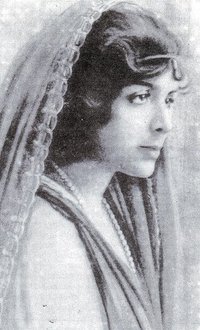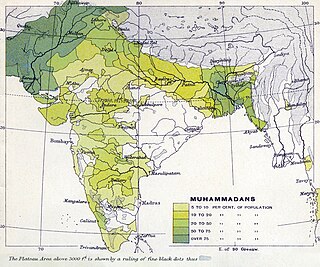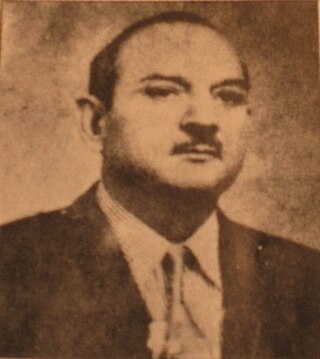South Court is the name of the houses of Muhammad Ali Jinnah in India and Pakistan.
- Jinnah Mansion, India
- Corps Commander House, Lahore, Pakistan
South Court is the name of the houses of Muhammad Ali Jinnah in India and Pakistan.

Rattanbai Jinnah, also known as Ruttie Jinnah, was the wife of Muhammad Ali Jinnah, an important figure in the creation of Pakistan and the country's founder. Additionally, Rattanbai Petit belonged to some of the most influential families of the Indian Subcontinent, the Petit family, through her father; and the Jinnah family through her marriage. Her daughter Dina Wadia married Bombay Dyeing chairman Neville Wadia, of the Wadia family.

Malabar Hill is a hillock and upmarket residential neighbourhood in South Mumbai, Maharashtra, India. Malabar Hill is one of the most exclusive residential areas in Mumbai. It is home to several business tycoons and film personalities. Notable residents include Adi Godrej, Radhakishan Damani, Chandrasekaran Natarajan, Cyrus Broacha, Ashish Pandey the Birla family, Shashi Ruia and family, Pallonji Mistry, the Jindal family, the Petit family, the Shah family, the Sanghvi family, the Bilakhia family, and the Thakkar family. As of 2014 it is one of the most expensive areas in the world regularly featuring in the top 10 world wide localities.

Bagh-e-Jinnah, formerly known as Lawrence Gardens, is a historical park in the city of Lahore, Pakistan. The large green space contains a botanical garden, Masjid Dar-ul-Islam, and Quaid-e-Azam Library.

The Pakistan Movement was a religious nationalist and political movement in the first half of the 20th century that aimed for the creation of Pakistan from the Muslim-majority areas of British India. It was connected to the perceived need for self-determination for Muslims under British rule at the time. Muhammad Ali Jinnah, a barrister and politician led this movement after the Lahore Resolution was passed by All-India Muslim League on 23 March 1940 and Ashraf Ali Thanwi as a religious scholar supported it.

Dina Wadia was the daughter of Muhammad Ali Jinnah, the founding father of Pakistan and Rattanbai Petit. She belonged to the prominent Jinnah family through her father, the Petit family through her mother, and to the Wadia family through her marriage to Neville Wadia.
Jinnah Mansion, also known as the South Court, is an unoccupied house in Malabar Hill, a premium neighbourhood of the city of Mumbai in India associated with Muhammad Ali Jinnah, the founder and first governor-general of Pakistan. It was built by Jinnah and remained his main residence for 10 years until he left in 1946 for Karachi.

Wazir Mansion, officially known as Quaid-e-Azam Birthplace Museum is a former family home in the Kharadar district South at Karachi, Sindh, Pakistan which is considered the birthplace of the country's founder, Muhammad Ali Jinnah.

The two-nation theory is an ideology of religious nationalism that advocates Muslim nationhood in South Asia, with separate homelands for the Muslims and Hindus within a decolonised British India. Its various descriptions of religious differences were the main factor in Muslim separatist thought in colonial India, asserting that the Muslims and Hindus are two separate nations, each with their own customs, traditions, art, architecture, literature, interests, and ways of life.

Fatima Jinnah was a Pakistani politician and stateswoman. She was the younger sister of Muhammad Ali Jinnah, the founder and the first governor-general of Pakistan. She was the Leader of the Opposition of Pakistan from 1960 until her death in 1967.

Jinnah is a 1998 Pakistani–British epic biographical film which follows the life of the founder of Pakistan, Muhammad Ali Jinnah. It was directed by Jamil Dehlavi, and written by Akbar S. Ahmed and Jamil Dehlavi. It stars Christopher Lee in the lead role as Jinnah.
Muhammad Munir was the second Chief Justice of Pakistan serving from 1954 to 1960.

Naseer Ahmad Malhi was a Pakistani politician, known for playing a pivotal role in the formation of the Islamic Republic of Pakistan. Malhi is recognised as one of the nation's activists of the Pakistan Movement.

The Shri Swami Narayan Mandir, Karachi is a Hindu temple that is the only Swami Narayan temple in Pakistan. The temple is notable for its size and frontage, over 32,306 square yards (27,012 m2) on the M. A. Jinnah Road in Karachi city. The temple celebrated its anniversary of 216 years in April 2004. There is a sacred cowshed within the premises of this temple. The temple is located at the centre of a Hindu neighbourhood in Karachi. The building that housed a dharmshala for visiting devotees has now been converted to the office of the City District Government.


The Jinnah family was a political family of Pakistan. Jinnahs have played an important role in the Pakistan Movement for creation of Pakistan, a separate country for Muslims of India. The family held the leadership of All-India Muslim League, and its successor, Muslim League, until it dissolved in 1958 by martial law. Originally from a Gujarati Khoja background, they moved to Karachi from Kathiawar, Bombay Province in 1875.

Muhammad Ali Jinnah was a barrister, politician and the founder of Pakistan. Jinnah served as the leader of the All-India Muslim League from 1913 until the inception of Pakistan on 14 August 1947, and then as the Dominion of Pakistan's first governor-general until his death.
Abu Bakr Ahmad Haleem was a Pakistani Muhajir political scientist and the first vice-chancellor of Karachi University.
Mohammad Amir Ahmed Khanراجا صاحب محمود آباد, titled as the Raja of Mahmudabad was a prominent politician and leader of the All India Muslim League, during the Pakistan Movement.